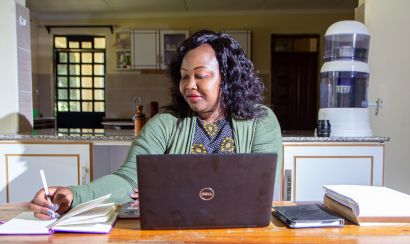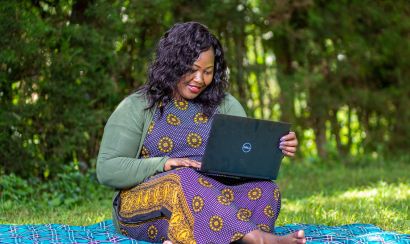5 tips for remaining productive during the pandemic (and beyond!)
We asked our staff to share their tips on how they've been setting themselves up for success at work during the pandemic

Class is in session! Our Kakamega HQ staff gather in the auditorium during a company event in 2019.
During the initial phase of the coronavirus pandemic just over a year ago, the most urgent priority for employees was to adapt to rapidly evolving circumstances - especially the 'new-normal' of working remotely. At the same time, organizations had to learn how to match employees to emerging functions and activities to keep operations going with minimal disruption.
One year on, the pandemic shows no sign of abating and we're being forced to think about the longer-term changes we as individuals, and organizations, need to make to ensure we're able to continue to operate successfully. Employees are learning new skills and employers are adapting their business models to ones that are better suited to both a pandemic, and post-pandemic, world.
At One Acre Fund, we've already started to implement a growth path beyond the pandemic. Here, 5 employees offer insights into how they are making sure they can thrive in the future.
1. Invest in a home working space
Many of us have set-up makeshift home offices but investing in a more permanent home working station is a good idea. We still don’t know when we might return to the ‘normal’ pre-COVID office world, so having the right equipment and physical setup is critical.
“Having worked from home for a full year now, my number one tip would be to invest in space. During the first few weeks of working remotely, I thought it literally meant I could work from anywhere, so I’d sit on my bed, on the couch, even outside; as long as I had a laptop and Internet, I was set! Not long after, I developed back and neck pain because of bad posture. So I invested in a home office — an ergonomic chair and table — which has saved me so much grief! And when working from home, I’d recommend getting up every two hours and taking a walk or dancing it off to relieve some stress and stay active,” — Ornella Hatungimana, Communications Specialist, Burundi
2. Commit to self-direction and empathy
Amid so much change, it is impressive how employees have stepped up to create positive impact and thrive in their roles. Our organization has always allowed staff, including those in more junior positions, to captain their own careers. But, as functions evolve and employees work to acquire the skills, resources, and support they need to grow, traditional training methods are giving way to new ones.
“Adaptability is a useful trait to develop. Keeping functioning even when I’m a little uncomfortable has helped me learn and build new skills and deliver results. At the same time, understanding the challenges that colleagues and even the organization face is important in a virtual workplace. Empathy is important not just to the people who are trying to make their way through personal or work-related chaos, but for colleagues to understand and know how to support,” — Kevin Motaroki, Writer/Editor, Kenya.
3. Manage your time effectively
Remote working gives employees the flexibility to work at a time when they feel most productive. But with such flexibility, it can be easy to get side-tracked or end up over-working. It helps to have a way of tracking your workday and keep yourself accountable for your tasks.
“One hack that has helped me keep on keeping on during the pandemic has been improving my time management, specifically by using simple free time tracker tools that I found online. My main reason for tracking my time is NOT to ensure that I reach a certain amount of hours worked per day. I instead use them to paint a picture of how I spend my time on different projects daily or even weekly. This information has allowed me to be more proactive in how I prioritize my time, by ensuring I spend most of my energy and time on the highest-value projects,” — Jeremy Osir, Business Development and Partnerships, United States
4. Establish meaningful connections
Establishing relationships with colleagues can make work feel less like a chore. By sharing bits of ourselves, we can understand each other’s needs better and connect more meaningfully - something that is even more important in our new virtual reality!
“Build in time to stay connected to colleagues beyond specific work assignments or deliverables. Remote working is intense and can feel isolating — there can be a feeling that all calls need to have a dedicated work focus as we're all so busy and online all day. But we need to make up for what we're missing through being in an office together: walking past each others' desks to say hello, grabbing a cup of tea together and catching up on life at home, walking to get lunch, etc. Building time for human connection — beyond the deadlines & deliverables — has helped me stay energized and feel supported through this pandemic,” — Holly Wyld, Partnerships & Business Development, United Kingdom.
5. Don't discard emotional skilling-up
The world after coronavirus will never be the same. And many traditional ideas and approaches to work and business won’t cut it. The new age needs us to innovate and adapt. By arming ourselves with the knowledge we need to work, as well as cognitive, emotional, and resilience skills, we will survive the stresses of the COVID workplace and thrive in it.
“I’m taking it a day at a time. This doesn’t mean I’m neglecting the future; I plan for it while managing expectations by focusing on what can be done now. I have found it important to remind myself that while I have little control over the future, I can control the things in the now. So I’m deliberate about being in the present; it's all I have. My advice is to find simple ways to build your resilience ‘bank’ to get through the uncertainty. It takes time and patience, but with small acts of self-care, you’ll feel recharged, which, in return, shall help you fill up that bank. Lastly, reach out to your friends and colleagues often. Don’t be forgettable,” — Nicolle Ndamu, Global Recruitment, Kenya.





